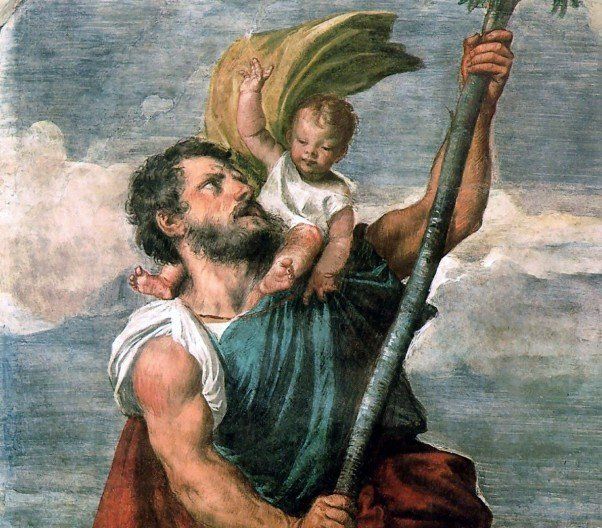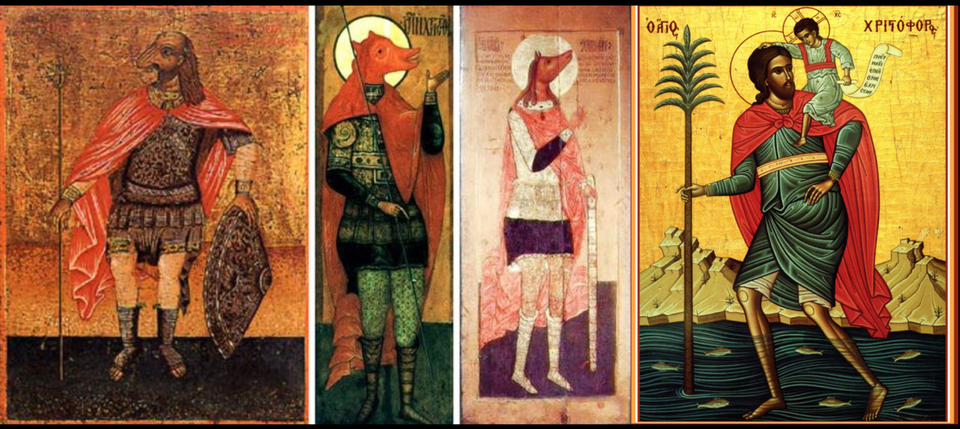The True Story of St Christopher
From the Bird's nest in the Cloister
Once upon a time, there was a nasty character called “Reprobus” (as in the word “reprobate”). In the Orthodox East he is remembered as a monster, and his icon shows him with the head of a dog. In the Catholic West, they say that he was a giant; and we all know that giants are only partly human, being the product of illicit sexual activity between angels of doubtful morality and human women (Gen. 6, 4). Reprobus was so nasty that he became an intimate friend and companion of the devil himself and he served him because he believed Satan to be the most powerful king in the world. Rebrobus was a soldier who went about doing harm.
One day, he was travelling with the devil when he came across a wayside cross. To his astonishment, the devil showed obvious signs of distress and fear. It became clear to Reprobus that whoever was represented by this cross was more powerful than the devil. He left the devil’s service and began to look for whoever it was with a cross as his badge.
It was not long before he met up with Christians, but his difficulties were just beginning. They showed no sign of worldly power, which was the only kind he knew. They were being persecuted in many places and were very peaceful and humble wherever they were, putting themselves out for people in need, more ready to serve than to dominate, the very opposite to his own behaviour. Moreover, this had something to do with the cross that put so much fear into the devil. He heard the Gospel and this made him want to become a Christian.
Reprobus encountered two enormous obstacles, the first in himself, the second among the very Christians he wanted to join. He discovered that he could neither pray nor fast - two of the principal Christian activities. The second obstacle was that the Christians would not accept him. Who has ever heard of baptising a monster? How is it possible to baptise a giant who isn’t really fully human? Reprobus felt despair.
He wandered the countryside, not knowing what to do. One day, by God’s providence, he came to a hermit’s hut and poured out his problems to the hermit that lived there. At that time, hermits were often the nearest thing to prophets, and this hermit was particularly wise and filled with the Spirit.
“You tell me that you can neither pray nor fast, and that, because you are a monster (or a giant), the Church refuses to baptise you. If those doors are shut to you, you must enter through a door that is open.
“Anyone who wishes to visit the town must cross a river which is deep and dangerous, and many in bad weather have died trying to cross. You can serve the good Lord by living on its banks, helping people to cross, even carrying them on your shoulders if needs be. Perhaps Christ will accept this service instead of those you cannot accomplish at present.”
This is what Reprobus did. He built himself a little hut by the river and accepted the task of helping people to cross. Little by little, he became a welcome sight for the people, especially when the river was dangerous. They began not to notice so much that he was a monster (or a giant).
One day, when the river was particularly dangerous and he had had to make the crossing many times, he was just about to take a well-earned rest when a little boy entered his hut. “Would you please take me across. I am sorry I am late,” said the little boy.
The coldness of the water cried out to him not to go. His tired limbs begged him not to go. The rain outside his nice warm hut called him not to go. But he looked into the little boy’s pleading eyes and he knew he must. Swinging the boy onto his shoulders, he stepped out into the cold and dark, climbed down the slippery river bank and began the crossing.
The further in he went, the heavier became the little boy on his shoulders until even his monstrous strength was not strong enough and he began to falter. “I can’t make it!” he gasped. “Yes you can,” said the child. In what seemed like ages later, he made it to the other bank. Swinging the little boy down, he said, “How can a little boy be so heavy, me being a monster and all that.”
The little boy smiled sweetly, “You had a little boy on your back and I had the whole world on mine, you didn’t do so badly.”
The little boy then revealed himself to be Christ, and he instructed the monster (or giant) to go and tell the bishop. “Tell him to baptise you with a new name. From now on, you shall be called, “Christopher” “Christ-bearer.” Then the child vanished.
Christopher gained
a reputation for holiness among Christians and was a cause of many conversions
to the faith. He was later martyred for the same faith by de-capitation.
I have called this “The
true Story of St Christopher” not because it literally happened, but because it
tells the truth, whether it actually happened or not.
One of the most
distorting things that has happened is dividing Catholics into “progressives”
and ”conservatives” The St Christopher story is Catholic and has
characteristics of both. Like “progressives”, it urges universal tolerance in
accepting all, even the most way out. Like “conservatives”, it tells us that
sin really is an obstacle to our relationship with God and insists on real
readiness to change as far as they can on those whom the Church accepts, and
trusts the grace of Christ to do the rest. Reprobus started off as a monster
and ended up a martyr. The story assumes that Christ is the Good Shepherd who
leaves the 99 to find those that are lost, not letting rules, however
important, to stand in his way.
Fr David is monk of Belmont who spent 36 years in Peru and has a particular interest in the church East and West. His other blog is 'Monks and Mermaids'.











